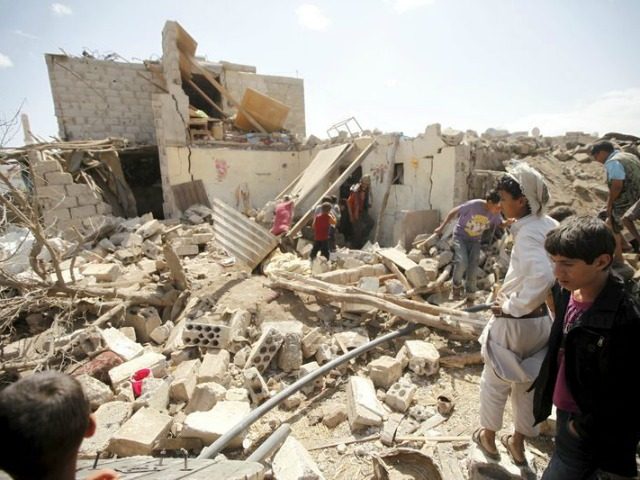The government of the United Arab Emirates (UAE) has announced that it will be withdrawing active combat troops from Yemen, where the UAE has been fighting alongside Saudi Arabia in defense of the internationally recognized government of President Abed Rabbo Mansour Hadi.
UAE Minister of State for Foreign Affairs Anwar Gargash announced Wednesday that the “war is over for our troops,” with an Arabic language statement saying that the war was “practically over,” according to the Associated Press (AP).
The AP noted that Emirati troops had seemingly not left Yemen and were, in fact, still guarding some parts of Aden, the southern port city that has become home to the legitimate Sunni government while the Shiite Houthi rebels control the capital, Sanaa.
The Emirati newspaper the Khaleej Times carried some of Gargash’s statement. The foreign affairs minister justified the decision of the UAE to accompany Saudi troops into Yemen to fight the Houthi rebels, supported by the government of Iran, citing a need to “draw a line in the sand” against foreign Shiite intervention in the region.
“The Decisive Storm operation had three goals. The first was to bring back the Yemen crisis to the political track, the second to restore the legitimate government of Yemen and the third goal was to counter the Iranian interference in the region,” he argued, adding that “the context of Iranian expansion in the region” made military action necessary.
Gargash also accused Iran of attempting to establish a base for the terrorist group Hezbollah in Yemen. “The crisis was one of Yemen, but Iran had an ability to exploit the sectarian dimension of the crisis,” he argued. “Can we accept ideologically driven sectarian militias operating on the border of Saudi Arabia?”
The UAE has said it will continue to play a role in the Yemeni civil war, but only a “political one” to “empower the Yemenis in the liberated areas.”
The UAE’s announced retreat comes three months after Saudi Arabia itself claimed that it would shut down major military operations in Yemen. In March, a spokesman for the Saudi-led coalition said that major military assaults would be “coming to an end” soon. “The next phase is a stage of restoring stability and reconstructing the country,” spokesman Brig. Gen. Ahmed al-Asseri said.
A month later, Houthi leaders began to say they believed a political solution to the civil war was on the horizon. “We were expecting there to be an agreement on a ceasefire after the signing of a political accord, on which an agreement is almost ready,” Abdel Malek al-Ijiri, a spokesman for the Houthis, said. Multiple ceasefires have come and gone since that statement was made, with major fighting continuing, including Houthi rocket launches into Saudi Arabia itself.
The Yemeni government and Houthi rebels have, for the past year, attempted to engage in UN-sponsored peace talks. These have largely failed. In statements this week, those participating in the talks have appeared increasingly despondent regarding a solution coming out of these talks. “The gap remains wide between the two sides,” a Western diplomat told the French newswire service Agence France-Presse, citing “persistent mutual distrust.” Yemeni Foreign Minister Abdul Malek Al Mikhlafi lamented that the talks “are revolving in a vacuum.”
Nonetheless, diplomatic talks have improved somewhat since last year. Nearly a year ago Thursday, a press conference by Houthi leaders ended in a fistfight after an anti-Houthi reporter threw a shoe at those speaking at the conference, a grave insult in Arab culture.
The United Nations has repeatedly accused Saudi Arabia of worsening the situation in Yemen since its decision to intervene in March 2015. This week, Saudi Arabia demanded the UN reveal sources it has used in reports where it has accused Saudi troops of being responsible for 60 percent of child deaths in Yemen. The UN refused.

COMMENTS
Please let us know if you're having issues with commenting.